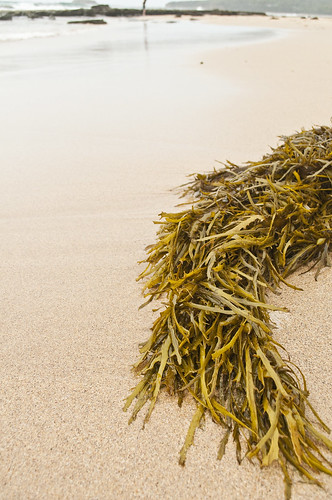 The decimation of a seaweed that provides vital habitat for an interdependent web of marine species off the Western Australian coast, as a consequence of a record ocean heatwave, has been revealed in a paper published in Proceedings of the Royal Society B last week.
The decimation of a seaweed that provides vital habitat for an interdependent web of marine species off the Western Australian coast, as a consequence of a record ocean heatwave, has been revealed in a paper published in Proceedings of the Royal Society B last week.The authors of the paper are from The University of Western Australia's Oceans Institute and School of Plant Biology, the Australian Institute of Marine Science and the Marine Biological Association of the UK. Australian Research Council Future Fellow Associate Professor Thomas Wernberg and Dr Daniel Smale wrote the paper "Extreme climatic event drives range contraction of a habitat-forming species" about the impact of the area's most extreme warming event which began in December 2010 and peaked in March 2011.
At its worst, ocean temperatures at Jurien Bay were five degrees higher than normal and for many weeks sea temperatures along more than 2000km of the Western Australian coastline were two to four degrees higher than normal.
"We've surveyed this coastline at three locations - Hamelin Bay, Marmion and Jurien Bay - almost every year since 2006," Dr Smale said. "During this heatwave we found that the seaweed Scytothalia dorycarpa - one of the most prominent habitat-forming species of the temperate coastline - retracted its range some 100km because the extreme temperatures exceeded its physiological threshold.
"This may have far-reaching implications for the structure and functioning of the marine ecosystem in the region, which is a global biodiversity hotspot."
The damage to S. dorycarpa left rocky reefs uncovered and reduced the amount of habitat available for small invertebrates and some other algae. This, in turn, could have knock-on effects on herbivorous fish and the carnivorous fish which prey on them.
"Extreme climate events are increasing in frequency and magnitude as a consequence of human activities and, in the last 30 years, the number of days of anomalously high seawater temperatures has increased along 38 per cent of the world's coastlines," the authors write.
"Understanding how these discrete disturbances drive abrupt ecological change is of fundamental importance to climate change mitigation and adaption."
Journal reference: Proceedings of the Royal Society B
Photo courtesy of littleyiye via Flickr (CC BY 2.0)
